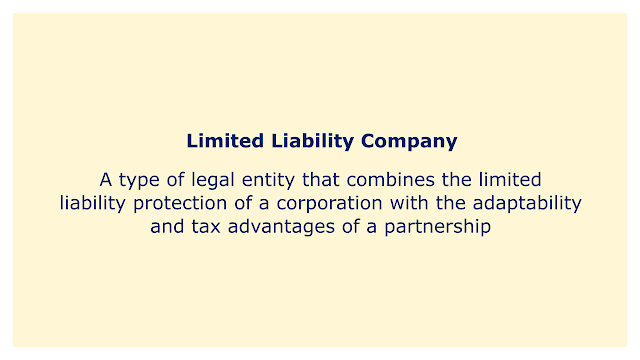 |
| Image: Moneybestpal.com |
A limited liability company (LLC) is a type of legal entity that combines the limited liability protection of a corporation with the adaptability and tax advantages of a partnership. The members, or owners, of an LLC, are only partially personally liable for the debts and liabilities of the company.
In principle, this means that the members are not personally liable for the company's debts, and a lawsuit or other legal action brought against the firm will not put their personal assets at risk.
An LLC is created by submitting articles of organization to the state where it will be located. The company name, member names, and business purpose are normally listed in the articles of the organization. The LLC is legally recognized as a distinct entity from its owners once the articles of the establishment have been submitted and approved.
The flexibility it offers in terms of taxation is one of the primary benefits of an LLC. An LLC is taxed by default as a pass-through entity, which means that the profits of the business are distributed to the individual members and are subject to their individual tax rates. This enables LLC members to avoid the double taxation that can happen with corporations when the profits of the business are taxed once when they are retained by the corporation and once more when they are given as dividends to shareholders.
The freedom it offers in terms of management and ownership structure is another benefit of an LLC. An LLC can be managed and owned by its members, who have the option to make decisions collectively or delegate decision-making authority to specific members or managers, in contrast to a corporation, which is required to have a board of directors and officers.
An LLC is created by submitting articles of organization to the state where it will be located. The company name, member names, and business purpose are normally listed in the articles of the organization. The LLC is legally recognized as a distinct entity from its owners once the articles of the establishment have been submitted and approved.
The flexibility it offers in terms of taxation is one of the primary benefits of an LLC. An LLC is taxed by default as a pass-through entity, which means that the profits of the business are distributed to the individual members and are subject to their individual tax rates. This enables LLC members to avoid the double taxation that can happen with corporations when the profits of the business are taxed once when they are retained by the corporation and once more when they are given as dividends to shareholders.
The freedom it offers in terms of management and ownership structure is another benefit of an LLC. An LLC can be managed and owned by its members, who have the option to make decisions collectively or delegate decision-making authority to specific members or managers, in contrast to a corporation, which is required to have a board of directors and officers.
